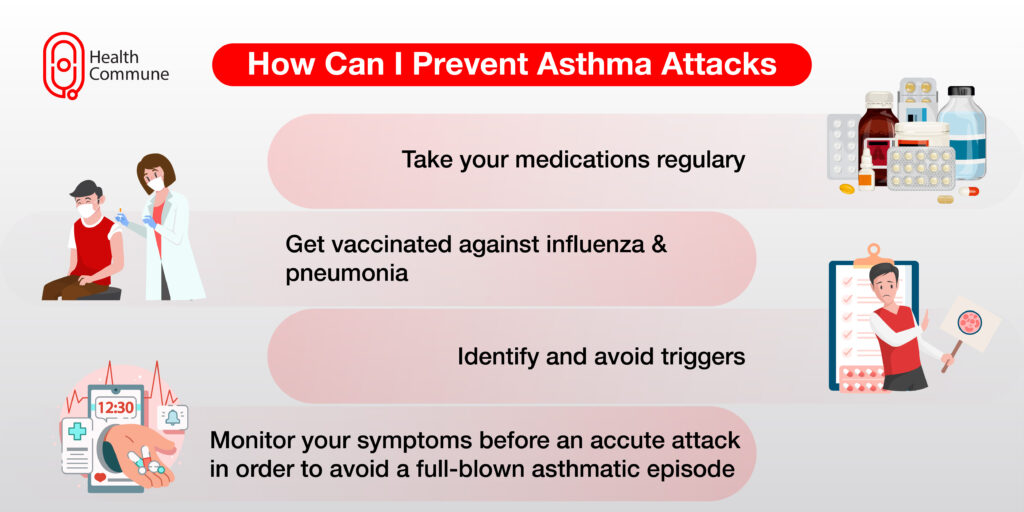What is asthma?
How is asthma caused?
While the exact cause is unknown, it develops as a combination of genetic and environmental factors. This condition can develop at any age, although the first episode usually occurs before 25 years of age.
- Genetic factors: People with allergies or a positive family history of allergies are more likely to develop asthma
- Environmental factors: Scientists came up with the ‘Hygiene hypothesis’ theory to explain how the environment affects a person’s chances of developing asthma. Babies who grew up without any infections were more likely to develop this disease compared to those who were exposed to bacteria and other germs, as this allowed their immune systems to develop properly and fight allergies.
What are the risk factors and triggers of asthma?
Some common risk factors and triggers include:
- Cold weather
- Exercise
- Air pollution
- Dust
- Viral infections
- Smoking (active or passive)
- Pollen
- Animal hair or dander
- Emotional stress
- Paint fumes or household sprays and chemicals
- Drugs such as aspirin, beta-blockers, oral contraceptives etc.
- Chewing betel nut
What are the symptoms of asthma?
Some common symptoms are:
- Wheezing
- Shortness of breath
- Cough
- Chest pain or tightness in the chest

What are the types of asthma?
Various types include:
- Episodic asthma: These are mild episodes that involve wheezing and shortness of breath. You’re completely normal between the episodes
- Severe acute asthma: This is the most severe form and is accompanied by severe airway obstruction and symptoms such as extreme shortness of breath, wheezing, tightness in the chest, increased heart rate, sweating and cough. In some cases, the person can also turn blue due to a lack of oxygen. They usually cannot sleep and prefer sitting upright to help with breathing
- Chronic asthma: This is long-term asthma with persistent symptoms such as wheezing, chest tightness and breathlessness that come and go and become worse at night. You can also cough up mucus or a foul-smelling sputum
Do I need to see a doctor for my asthma?
Danger signs that require immediate medical attention are:
- Shortness of breath even while resting or doing minimal work
- No improvement of symptoms in despite using your inhaler
- Bluish discolouration of the skin
How is asthma diagnosed?
Your doctor can diagnose the condition based on your symptoms and the clinical findings. They’ll take your medical history in detail, including the onset, intensity, duration and triggers of your symptoms and during which months and times of the day they increase, along with your family history and any allergies you may have. They’ll go on to do a physical examination and place a stethoscope over your chest and back to listen to your breath sounds.
Additional tests that help with diagnosis are:
- Spirometry: This is the most commonly done test and is used to assess your lung function. You’ll be asked to breathe in and out of a tube and this measures how much air you can inhale and exhale, as well as how quickly you exhale
- Peak flow meter: In case spirometry is not available, your doctor can use a peak flow meter to measure how quickly you can exhale out air
- Airway responsiveness (AHR): This is to determine if you have a ‘hyperresponsive’ airway, a key feature of this disease
- Exercise test: This can be done in patients whose asthma is offset by exercise
- Chest X-ray: This is helpful in excluding any complications
- High-resolution CT scan: This is useful to detect bronchiectasis, a complication of asthma
- Skin prick test: For patients with allergies, this test is useful to detect the exact cause of allergy so that it can be avoided
How is asthma treated?
It’s important to identify and avoid triggers or allergens that worsen your condition. Your doctor will also prescribe certain medications that can help relieve your symptoms such as:
Bronchodilators: These drugs act on the beta receptors present in the lungs and cause the muscles of the airways to relax, thereby allowing more air to enter. They also allow mucus to move more easily through the airways. These include:
- Beta-agonists
- Methylxanthines
- Antimuscarinic drugs
Corticosteroids: These are anti-inflammatory agents that are the most effective in controlling your symptoms. They can either be taken orally or through an inhaler. Rarely, in severe acute cases, they can be injected into the vein
Anti-IgE monoclonal antibodies: These are recombinant antibodies that neutralise the antibodies responsible for eliciting allergic reactions
What are the complications of asthma?
Severe acute asthma can be life-threatening.
Complications include:
- Pneumonia
- Collapse of one part or the entire lung
- Hyperinflation of lungs
- Respiratory failure
Can asthma be cured?
How can I prevent asthma attacks?
To reduce your chances of an acute attack, you can:
- Identify and avoid triggers
- Take your medications regularly
- Get vaccinated against influenza and pneumonia
- Monitor your symptoms before an acute attack to take rapid measures and avoid a full-blown asthmatic episode.




